重点小学英语一般疑问句和特殊疑问句
小学英语语法---一般疑问句和特殊疑问句

5.Amy likes summer very much.
Thank You !
He is Tom. He is not Tom.
变一般疑问句的做法:
1、如果句子里是be动词:把am , is,are,was,were 这些词提到 句子开头。 例:
2、二人称(复数)加Do ,第三人称单数加 Does如果句子里是动 词就在这些词前加 Do,Does , Did (1)主语是第一、 (2)如果是过去式就加Did 例:I like dogs. She likes swimming. Do you like dogs ? Does she like swimming ? I liked the meat. Did you like meat ? 3、如句子里是情态动词是must ,can ,may , should 就在这些词 后加not 例句:You can watch TV now. You can not watch TV now.
Homework :作业 (划线部分提问)
1.Mike went to Chongqing yesterday. 2.My father went to Shanghai last night. 3.John is playing football in the grass. 4.I go to Xingjiang by plane.
Exercises :针对下列划线部分提问
1.We are going to Hainan. Where are you going ? 2.Amy goes to Shanghai in February. When does Amy go to Shanghai? 3.Kitty is wearing a special costume. Who is wearing a special costume? 4.I go to school by bike. How do you go to school? 5.I like summer best. Which season do you like best? 6.My name is John. What is your name?
小学英语特殊疑问句和一般疑问句地归纳

特殊疑问句和一般疑问句的答法一般疑问句通常都是 1..以be (am,is,are,)开头2.以Do,Does,Did 开头或以Can开头回答方法:前面用什么提问的就用什么答。
只有两种回答方式:1)肯定的, Yes,主语 + 提问词.2)否定的 No,主语+提问词+not.【注意:问句与答句的第一二人称要互换】如:④主语是名字时的答语:看性别,男的用he ,女的用she ,其他的用it 复数就用they。
如:①Is she……? Is he………? Is it……..?Yes, she is. Yes, he is. Yes, it is.No, she isn,t. No, he isn,t. No, it isn,t.②Are they………? Are the monkeys …….?Yes, they are. Yes, they are.No,they aren’t No,they aren’t③ Do they………? Does he……..? Did she…….?Yes,they do. Yes,he does. Yes, she did.No,they don’t. No,he doesn’t. No,she didn’t.④Are you……..? Are you……..? Do you…….?Yes, I am. Yes, we are. Yes ,I do. 或 Yes,No, I am not. No, we aren’t. No,I don’t. 或No,⑤Does Mike…….? Is ChenJi…..? Do your parents…?Yes ,he does. Yes , she is. Yes, they do.No,he doesn’t. No, she isn’t. No,they don’t.一、专项练习。
1. Did ChenJie read books yesterday?2. Can the girl cook the meals ?—————————————————————————————3.Is he going to swim this afternoon?4. Are they going to take a trip next weend? ————————————————————————————————5.Does he often go to school by bike ? 6. Do you play basketball every weekend? ———————————————————————————————————7. Did Mike do his homework yesterday? 8. Are they playing basketball now?————————————————————————————————一般疑问句及特殊疑问句的总结一般疑问句的定义:用yes或no来回答的疑问句叫一般疑问句。
英语中一般疑问句和特殊疑问句的特点
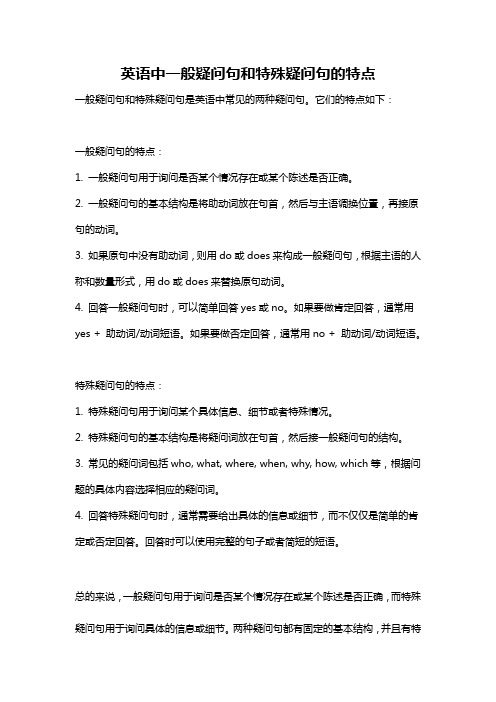
英语中一般疑问句和特殊疑问句的特点
一般疑问句和特殊疑问句是英语中常见的两种疑问句。
它们的特点如下:
一般疑问句的特点:
1. 一般疑问句用于询问是否某个情况存在或某个陈述是否正确。
2. 一般疑问句的基本结构是将助动词放在句首,然后与主语调换位置,再接原句的动词。
3. 如果原句中没有助动词,则用do或does来构成一般疑问句,根据主语的人称和数量形式,用do或does来替换原句动词。
4. 回答一般疑问句时,可以简单回答yes或no。
如果要做肯定回答,通常用yes + 助动词/动词短语。
如果要做否定回答,通常用no + 助动词/动词短语。
特殊疑问句的特点:
1. 特殊疑问句用于询问某个具体信息、细节或者特殊情况。
2. 特殊疑问句的基本结构是将疑问词放在句首,然后接一般疑问句的结构。
3. 常见的疑问词包括who, what, where, when, why, how, which等,根据问题的具体内容选择相应的疑问词。
4. 回答特殊疑问句时,通常需要给出具体的信息或细节,而不仅仅是简单的肯定或否定回答。
回答时可以使用完整的句子或者简短的短语。
总的来说,一般疑问句用于询问是否某个情况存在或某个陈述是否正确,而特殊疑问句用于询问具体的信息或细节。
两种疑问句都有固定的基本结构,并且有特
定的回答方式。
小学英语特殊疑问句和一般疑问句的归纳

特殊疑问句和一般疑问句的答法一般疑问句通常都是1..以be (am,is,are,)开头2.以Do,Does,Did 开头或以Can开头回答方法:前面用什么提问的就用什么答。
只有两种回答方式:1)肯定的,Yes,主语+ 提问词.2)否定的No,主语+提问词+not.【注意:问句与答句的第一二人称要互换】如:④主语是名字时的答语:看性别,男的用he ,女的用she ,其他的用it 复数就用they。
如:①Is she……? Is he………? Is it……..?Yes, she is.Yes, he is. Yes, it is.No, she isn,t. No, he isn,t. No, it isn,t.②Are they………? Are the monkeys …….?Yes, they are.Yes, they are.No,they aren’t No,they aren’t③Do they………?Does he……..? Did she…….?Yes,they do. Yes,he does. Yes, she did.No,they don’t. No,he doesn’t. No,she didn’t.④Are you……..?Are you……..? Do you…….?Yes, I am.Yes, we are. Yes ,I do. 或Yes,No, I am not. No, we aren’t. No,I don’t. 或No,⑤Does Mike…….? Is ChenJi…..? Do your parents…?Yes ,he does.Yes , she is. Yes, they do.No,he doesn’t. No, she isn’t. No,they don’t.一、专项练习。
1. Did ChenJie read books yesterday?2. Can the girl cook the meals ?—————————————————————————————3.Is he going to swim this afternoon?4. Are they going to take a trip next weend? ————————————————————————————————5.Does he often go to school by bike ? 6. Do you play basketball every weekend? ———————————————————————————————————7. Did Mike do his homework yesterday? 8. Are they playing basketball now?————————————————————————————————一般疑问句及特殊疑问句的总结一般疑问句的定义:用yes或no来回答的疑问句叫一般疑问句。
小学英语特殊疑问句和一般疑问句的归纳

特殊疑问句和一般疑问句的答法一般疑问句通常都是 1..以be (am,is,are,)开头2.以Do,Does,Did 开头或以Can开头回答方法:前面用什么提问的就用什么答。
只有两种回答方式:1)肯定的, Yes,主语 + 提问词.2)否定的 No,主语+提问词+not.【注意:问句与答句的第一二人称要互换】如:④主语是名字时的答语:看性别,男的用he ,女的用she ,其他的用it 复数就用they。
如:①Is she…… Is he……… Is it……..Yes, she is. Yes, he is. Yes, it is.No, she isn,t. No, he isn,t. No, it isn,t.②Are they……… Are the monkeys …….Yes, they are. Yes, they are.No,they aren’t No,they aren’t③ Do they……… Does he…….. Did she…….Yes,they do. Yes,he does. Yes, she did.No,they don’t. No,he doesn’t. No,she didn’t.④Are you…….. Are you…….. Do you…….Yes, I am. Yes, we are. Yes ,I do. 或 Yes,No, I am not. No, we aren’t. No,I don’t. 或No,⑤Does Mike……. Is ChenJi….. Do your parents…Yes ,he does. Yes , she is. Yes, they do.No,he doesn’t. No, she isn’t. No,they don’t.111v1.0 可编辑可修改一、专项练习。
1. Did ChenJie read books yesterday2. Can the girl cook the meals—————————————————————————————he going to swim this afternoon 4. Are they going to take a trip next weekend ————————————————————————————————5.Does he often go to school by bike 6. Do you play basketball every weekend ———————————————————————————————————7. Did Mike do his homework yesterday 8. Are they playing basketball now————————————————————————————————一般疑问句及特殊疑问句的总结一般疑问句的定义:用yes或no来回答的疑问句叫一般疑问句。
小学英语特殊疑问句和一般疑问句的答法

小学英语特殊疑问句和一般疑问句的答法,一般疑问句通常都是1..以be动词(am,is,are,)开头2.以情态动词Do,Does,Did 开头或以Can 开头回答方法:前面用什么提问的就用什么答。
只有两种回答方式:1)肯定的,Yes,主语+ 提问词. 2)否定的No,主语+提问词+not.【注意:问句与答句的第一二人称要互换】are not = aren’t.主语是名字时的答语:看性别,男的用he ,女的用she ,其他的用it 复数就用they。
如:①Is she……? I s he………? Is it……..?Yes, she is. Yes, he is. Yes, it is.No, she isn,t. No, he isn,t. No, it isn,t.②Are the y………? Are the monkeys …….?Yes, they are. Yes, they are.No,they aren’t No,they aren’t③Do they………?Does he……..? Did she…….?Yes,they do. Yes,he does. Yes, she did.No,they don’t. No,he doesn’t. No,she didn’t.④Are you……..? Are you……..? Do you…….?Yes, I am. Yes, we are. Yes ,I do. 或Yes,No, I am not. No, we aren’t. No,I don’t. 或No,⑤D oes Mike…….? Is ChenJi…..? Do your parents…?Yes ,he does. Yes , she is. Yes, they do.No,he doesn’t. No, she isn’t. No,they don’t.提问时I/we变you , my变your. Some变any.重点:给一个句子变一般疑问句并回答1.例如:He is tall 。
小学英语一般疑问句和特殊疑问句(附练习题)
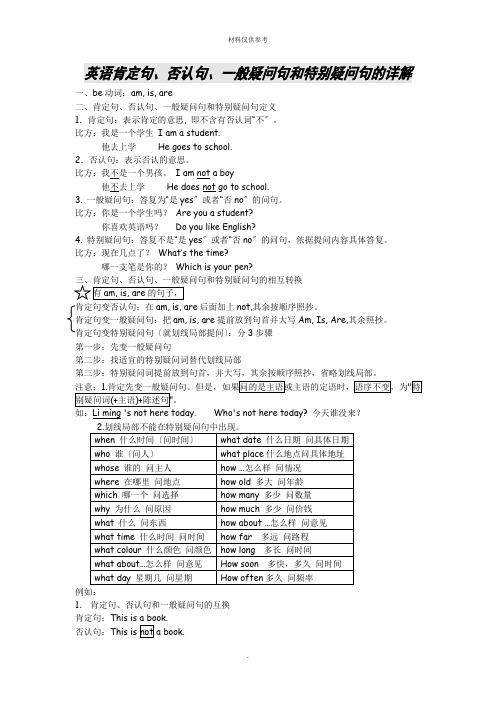
英语肯定句、否认句、一般疑问句和特别疑问句的详解一、be动词:am, is, are二、肯定句、否认句、一般疑问句和特别疑问句定义1.肯定句:表示肯定的意思, 即不含有否认词“不〞。
比方:我是一个学生I am a student.他去上学He goes to school.2.否认句:表示否认的意思。
比方:我不是一个男孩。
I am not a boy他不去上学He does not go to school.3. 一般疑问句:答复为“是yes〞或者“否no〞的问句。
比方:你是一个学生吗?Are you a student?你喜欢英语吗?Do you like English?4. 特别疑问句:答复不是“是yes〞或者“否no〞的问句,依据提问内容具体答复。
比方:现在几点了?What’s the time?哪一支笔是你的?Which is your pen?am, is, are后面加上not,其余按顺序照抄。
肯定句变一般疑问句:把am, is, are提前放到句首并大写Am, Is, Are,其余照抄。
:分3步骤第一步:先变一般疑问句第二步:找适宜的特别疑问词替代划线局部第三步:特别疑问词提前放到句首,并大写,其余按顺序照抄,省略划线局部。
如:Li ming 's not here today.Who's not here today? 今天谁没来?例如:1.肯定句、否认句和一般疑问句的互换肯定句:否认句:一般疑问句:Is this a book?肯定答复:Yes, it is.否认答复:No, it isn’t.2.就划线局部提问(变特别疑问句)This is a book.第一步:变一般疑问句Is this a book?第二步:找适宜的特别疑问词Is this what ?第三步:特别疑问词提前放到句首,并大写,其余按顺序照抄,省略划线局部。
do not或者does not,其余按顺序照抄动词用原形肯定句变一般疑问句:在句首加do或者does并大写,其余照抄。
一般疑问句和特殊疑问句知识点总结

一般疑问句和特殊疑问句知识点总结一、一般疑问句。
1. 定义。
- 一般疑问句是用来询问某事是否属实,需要用“是(yes)”或“否(no)”来回答的疑问句。
例如:“Are you a student?”(你是一名学生吗?)2. 结构。
- be动词(am/is/are/was/were)开头的一般疑问句。
- 当句子中有be动词时,将be动词提到句首,句末加问号,句子中的主语如果是第一人称要变为第二人称。
- 肯定句:I am a teacher.(我是一名教师。
)- 一般疑问句:Are you a teacher?(你是一名教师吗?)- 其回答形式为:Yes, 主语+be动词. / No, 主语+be动词+not.- 例如:Are you from China? Yes, I am. / No, I'm not.- 助动词(do/does/did)开头的一般疑问句。
- 当句子中的谓语动词是实义动词,且句子时态为一般现在时(主语不是第三人称单数用do,主语是第三人称单数用does)或一般过去时(用did)时,将助动词提到句首,动词恢复原形,句末加问号。
- 肯定句:He likes apples.(他喜欢苹果。
)- 一般疑问句:Does he like apples?(他喜欢苹果吗?)- 肯定句:I played football yesterday.(我昨天踢足球了。
)- 一般疑问句:Did you play football yesterday?(你昨天踢足球了吗?)- 回答形式为:Yes, 主语+do/does/did. / No, 主语+don't/doesn't/didn't.- 例如:Do they go to school by bike? Yes, they do. / No, they don't.- 情态动词(can/could/may/must等)开头的一般疑问句。
小学英语重点疑问句归纳
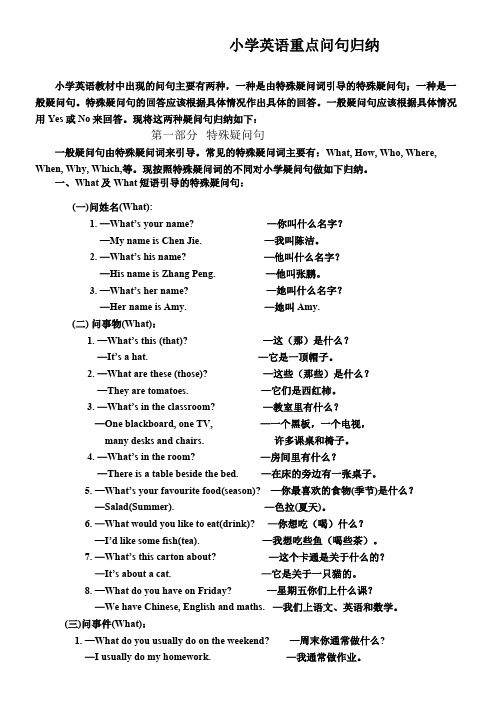
小学英语重点问句归纳小学英语教材中出现的问句主要有两种,一种是由特殊疑问词引导的特殊疑问句;一种是一般疑问句。
特殊疑问句的回答应该根据具体情况作出具体的回答。
一般疑问句应该根据具体情况用Yes或No来回答。
现将这两种疑问句归纳如下:第一部分特殊疑问句一般疑问句由特殊疑问词来引导。
常见的特殊疑问词主要有:What, How, Who, Where,When, Why, Which,等。
现按照特殊疑问词的不同对小学疑问句做如下归纳。
一、What及What短语引导的特殊疑问句:(一)问姓名(What):1. —What’s your name? —你叫什么名字?—My name is Chen Jie. —我叫陈洁。
2. —What’s his name? —他叫什么名字?—His name is Zhang Peng. —他叫张鹏。
3. —What’s her name? —她叫什么名字?—Her name is Amy. —她叫Amy.(二) 问事物(What):1. —What’s this (that)? —这(那)是什么?—It’s a hat. —它是一顶帽子。
2. —What are these (those)? —这些(那些)是什么?—They are tomatoes. —它们是西红柿。
3. —What’s in the classroom? —教室里有什么?—One blackboard, one TV, —一个黑板,一个电视,many desks and chairs. 许多课桌和椅子。
4. —What’s in the room? —房间里有什么?—There is a table beside the bed. —在床的旁边有一张桌子。
5. —What’s your favourite food(season)? —你最喜欢的食物(季节)是什么?—Salad(Summer). —色拉(夏天)。
小学英语重点疑问句归纳

小学英语重点问句归纳小学英语教材中出现的问句主要有两种,一种是由特殊疑问词引导的特殊疑问句;一种是一般疑问句。
特殊疑问句的回答应该根据具体情况作出具体的回答。
一般疑问句应该根据具体情况用Yes或No来回答.现将这两种疑问句归纳如下:第一部分特殊疑问句一般疑问句由特殊疑问词来引导。
常见的特殊疑问词主要有:What, How, Who,Where, When, Why, Which,等。
现按照特殊疑问词的不同对小学疑问句做如下归纳。
一、What及What短语引导的特殊疑问句:(一)问姓名(What):1. -What’s your name? -你叫什么名字?—My name is Chen Jie。
—我叫陈洁。
2. —What's his name?—他叫什么名字?-His name is Zhang Peng. —他叫张鹏。
3. —What’s her name? -她叫什么名字?—Her name is Amy. —她叫Amy.(二) 问事物(What):1. —What’s this (that)? -这(那)是什么?—It’s a hat。
-它是一顶帽子。
2。
-What are these (those)? -这些(那些)是什么?-They are tomatoes. —它们是西红柿。
3。
—What's in the classroom?—教室里有什么?—One blackboard, one TV,—一个黑板,一个电视, many desks and chairs。
许多课桌和椅子。
4. —What’s in the room?—房间里有什么?-There is a table beside the bed. —在床的旁边有一张桌子。
5。
—What’s your favourite food(season)? -你最喜欢的食物(季节)是什么?—Salad(Summer). —色拉(夏天)。
【免费】小学三年级英语语法:一般疑问句及特殊疑问句
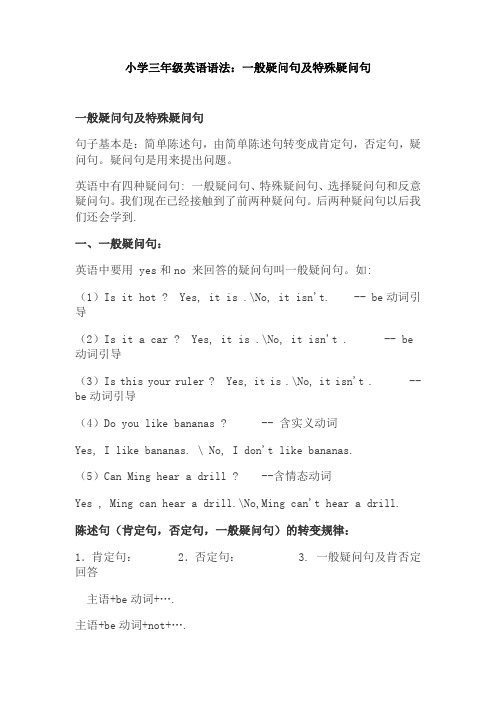
小学三年级英语语法:一般疑问句及特殊疑问句一般疑问句及特殊疑问句句子基本是:简单陈述句,由简单陈述句转变成肯定句,否定句,疑问句。
疑问句是用来提出问题。
英语中有四种疑问句: 一般疑问句、特殊疑问句、选择疑问句和反意疑问句。
我们现在已经接触到了前两种疑问句。
后两种疑问句以后我们还会学到.一、一般疑问句:英语中要用 yes和no 来回答的疑问句叫一般疑问句。
如:(1)Is it hot ? Yes, it is .\No, it isn't. -- be动词引导(2)Is it a car ? Yes, it is .\No, it isn't . -- be动词引导(3)Is this your ruler ? Yes, it is .\No, it isn't . -- be动词引导(4)Do you like bananas ? -- 含实义动词Yes, I like bananas. \ No, I don't like bananas.(5)Can Ming hear a drill ? --含情态动词Yes , Ming can hear a drill.\No,Ming can't hear a drill.陈述句(肯定句,否定句,一般疑问句)的转变规律:1.肯定句: 2.否定句: 3. 一般疑问句及肯否定回答主语+be动词+….主语+be动词+not+….be动词+主语+…?Yes, 主语+be动词./No, 主语+be动词+not.I am a teacher. I am not a teacher. Are you a teacher?--Yes, I am./ No, I am not.My mother is thin. My mother is not /isn'tthin. Is your mother thin?--Yes, she is./ No, she isn't.They are insects. They are not/aren't insects. Are they insects?--Yes. they are./ No, they aren't.主语+情态动词can+…主语+情态动词can+ not+….情态动词can+主语+…?Yes, 主语+情态动词can/No,主语+情态动词can+ notHe can jump. Hecan not/can't jump. Can he jump?--Yes,he can./ No, he can't.主语+动词+….主语+助动词do/does+not助动词do/does+主语+…. 动词原形 +….动词原形?Yes, 主语+助动词do/does.No, 主语+助动词do/does+not.He likes to eat apples. He doesn't like to eat apples. Does he like to eat apples?Yes,he does./ No,he doesn't.We like to eat apples. We don't like to eat apples. Do you like to eat apples?Yes,we do. /No,we don't.二、祈使句:表示请求、命令、建议或劝告等的句子叫祈使句,主语you常省略。
小学英语一般疑问句和特殊疑问句(附练习题)
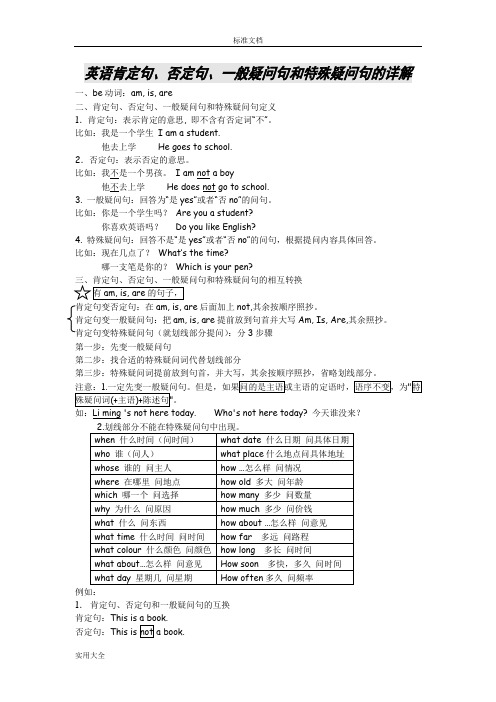
英语肯定句、否定句、一般疑问句和特殊疑问句的详解一、be动词:am, is, are二、肯定句、否定句、一般疑问句和特殊疑问句定义1.肯定句:表示肯定的意思, 即不含有否定词“不”。
比如:我是一个学生I am a student.他去上学He goes to school.2.否定句:表示否定的意思。
比如:我不是一个男孩。
I am not a boy他不去上学He does not go to school.3. 一般疑问句:回答为“是yes”或者“否no”的问句。
比如:你是一个学生吗?Are you a student?你喜欢英语吗?Do you like English?4. 特殊疑问句:回答不是“是yes”或者“否no”的问句,根据提问内容具体回答。
比如:现在几点了?What’s the time?哪一支笔是你的?Which is your pen?am, is, are后面加上not,其余按顺序照抄。
肯定句变一般疑问句:把am, is, are提前放到句首并大写Am, Is, Are,其余照抄。
:分3步骤第一步:先变一般疑问句第二步:找合适的特殊疑问词代替划线部分第三步:特殊疑问词提前放到句首,并大写,其余按顺序照抄,省略划线部分。
如:Li ming 's not here today.Who's not here today? 今天谁没来?例如:1.肯定句、否定句和一般疑问句的互换肯定句:否定句:一般疑问句:Is this a book?肯定回答:Yes, it is.否定回答:No, it isn’t.2.就划线部分提问(变特殊疑问句)This is a book.第一步:变一般疑问句Is this a book?第二步:找合适的特殊疑问词Is this what ?第三步:特殊疑问词提前放到句首,并大写,其余按顺序照抄,省略划线部分。
do not或者does not,其余按顺序照抄动词用原形肯定句变一般疑问句:在句首加do或者does并大写,其余照抄。
五年级英语一般疑问句和特殊疑问句知识精讲重点

英语一般疑问句和特殊疑问句知识精讲疑问句可再分为一般疑问和特殊疑问两种。
一、一般疑问:用be或助动词或情态动词置于句首,并以“Yes,…”,或“No,…”回答的问句称为一般疑问句.1.含系动词be的一般疑问句的构成具体地说,am 只能跟在第一人称的单数 I 后面,are 搭配 you,is 跟在第三人称单数 he, she 后面.be 动词的基本意思:是.I'm in Class 2, Grade 1. →Are you in Class 2, Grade 1? 你是在一年级二班吗?(如遇第一人称,最好将其置换成第二人称)It's a map of China. →Is it a map of China? 这是一幅中国地图吗?Am I wrong again? (我又错了?)Yes, you are (wrong again). (是的,你又错了。
)No, you aren’t. (不,你没错。
)Is it your bicycle? (这辆自行车是你的吗?)Yes, it is. (是的,是我的。
)No, it isn’t. (不,那不是我的。
)2.含情态动词的一般疑问句的构成一般疑问句面前人人平等:情态动词与am / is / are一样,也可直接将它们提至主语前,所以问题迎刃而解了。
如:I can spell it. →Can you spell it? 你会拼写它吗?Shall I call a taxi for you ? (需要我替你叫一辆出租车吗?)Yes, please. Thank you. (好的,谢谢你。
)No, thank you.(不必了,谢谢你。
)Will you do that for her? (你愿意替她做那件事吗?)Yes, I will.(是的,我愿意。
)No, I won’t.(不,我不愿意。
)Can she drive? (她会开车吗?)Yes, she can.(是的,她会。
小学英语一般疑问句和特殊疑问句总结

小学英语一般疑问句和特殊疑问句总结小学语法之疑问句一、一般疑问句一般疑问句是指可以用Yes或No作答的疑问句。
这种疑问句通常以be动词、助动词或情态动词开头,句末读升调。
肯定陈述句可以通过两种方式变成一般疑问句。
首先,如果原句中有be动词或情态动词,将其提到句首,句末加问号即可。
其次,如果原句中没有be动词或情态动词,需要在主语前加助动词(一般现在时do、does、一般过去时did),并将谓语动词变回原形。
需要注意的是,如果陈述句中有第一人称,则变问句时要变为第二人称。
另外,如果陈述句中有some,则变问句时往往要变成any。
一般疑问句的回答可以用Yes或No,并在主语后加上相应的be动词、助动词或情态动词。
如果回答是否定的,则需要在be动词、助动词或情态动词后面加上not的否定形式缩写。
Can she dance。
Yes。
she can.When asked if she can dance。
XXX。
If the subject of the n is "this" or "that"。
the answer should use "it" instead。
If the subject is "these" or "those"。
the answer should use "they" instead.Is this your bag?Yes。
it is。
/ No。
it isn't.Are those your books?Yes。
they are。
/ No。
they aren't.Practice:1.What did his father do for a living?2.Why are these cats crying?3.Who can swim?4.How did you go to school?5.How does his XXX work?6.Can Mrs。
(完整版)小学英语一般疑问句和特殊疑问句(附练习题)

一、一般疑问句1、定义 : 用 Yes 或 No 作答的疑问句叫一般疑问句。
2、特色:1、以 be 动词、助动词或神态动词开头;例:Is your father a teacher? Does Tom like apples? Can Jenny speak English? 2、常常读升调3、陈说句变为一般疑问句的方法:1> 看陈说句中有没有be 动词(am、is、 are、 was、 were)或神态动词( can),假如有,将其提到句首,句末打上问号即可。
例: It was rainy yesterday.→Was it rainy yesterday?Tom's father can play the piano.→Can Tom's father play the piano?2>假如句中没有 be 动词或神态动词,句首加do 的相应形式( do、does、did),且原句的谓语动词要变回原形。
1.They go to school by bike.→ Do they go to school by bike?2.Bill gets up at 6:30 every day.→ Does bill gets up at 6:30 every day?3.The students saw a film yesterday.→ Did the students see a film yesterday?注: 1.假如陈说句中有第一人称,则变问句时要变为第二人称。
I usually have lunch at school.→ Do you usually have lunch at school?2.假如陈说句中有some, 则变问句时常常要变为any 。
There is some water on the playground. → Is there any water on the playground4、一般疑问句的回答。
小学英语肯定句、否定句、一般疑问句和特殊疑问句地详解
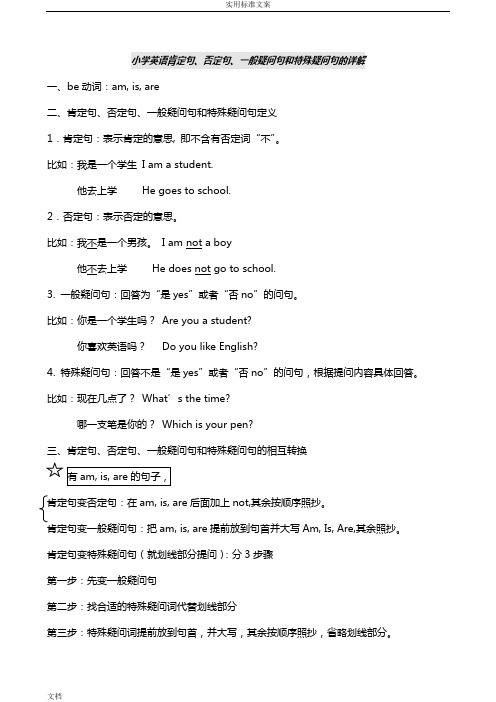
小学英语肯定句、否定句、一般疑问句和特殊疑问句的详解一、be动词:am, is, are二、肯定句、否定句、一般疑问句和特殊疑问句定义1.肯定句:表示肯定的意思, 即不含有否定词“不”。
比如:我是一个学生I am a student.他去上学He goes to school.2.否定句:表示否定的意思。
比如:我不是一个男孩。
I am not a boy他不去上学He does not go to school.3. 一般疑问句:回答为“是yes”或者“否no”的问句。
比如:你是一个学生吗?Are you a student?你喜欢英语吗?Do you like English?4. 特殊疑问句:回答不是“是yes”或者“否no”的问句,根据提问内容具体回答。
比如:现在几点了?What’s the time?哪一支笔是你的?Which is your pen?三、肯定句、否定句、一般疑问句和特殊疑问句的相互转换肯定句变否定句:在am, is, are后面加上not,其余按顺序照抄。
am, is, are提前放到句首并大写Am, Is, Are,其余照抄。
肯定句变特殊疑问句(就划线部分提问):分3步骤第一步:先变一般疑问句第二步:找合适的特殊疑问词代替划线部分第三步:特殊疑问词提前放到句首,并大写,其余按顺序照抄,省略划线部分。
注意:1.如:Li ming 's not here today. Who's not here today? 今天谁没来?2.划线部分不能在特殊疑问句中出现。
例如:1.肯定句、否定句和一般疑问句的互换肯定句:This is a book.否定句:一般疑问句:Is this a book?肯定回答:Yes, it is.否定回答:No, it isn’t.2.就划线部分提问(变特殊疑问句)This is a book.第一步:变一般疑问句Is this a book?第二步:找合适的特殊疑问词Is this what ?第三步:特殊疑问词提前放到句首,并大写,其余按顺序照抄,省略划线部分。
小学英语语法一般疑问句和特殊疑问句

(2)如果是过去式就加didn't
例:I like dogs.
She likes swimming.
I don‘t like dogs.
She doesn’t like swimming.
3、如句子里是情态动词是must,can,may,should 就在这些词后
加not
例句:You can watch TV now.
You can not watch TV now.
特殊疑问句
表示疑问,有疑问词(在开头),回答有很
多种可能。
常用疑问词:
When 什么时间 (问时间)
Who 谁
( 问人)
Where 在哪里
(问地点)
Which 哪一个 (问选择)
Why 为什么 (问原因)
What 什么
( 问东西、事物)
How 怎样 (问 Who is this man? A. I went to the bookstore.
2. Where did you go yesterday? B. I am 45 kg.
3. How heavy are you?
C. My father.
4. What did you do last night? D. It was fine.
变否定句的做法:
1、如句子里是be动词:am,is,are,was,were 就在这些词后加 not
例: He is Tom.
He is not Tom.
2、如句子里是动词就在这些词前加 don't,doesn't,didn't
(1)主语是第一、二人称(复数)加don’t,第三人称单数加
doesn't
- 1、下载文档前请自行甄别文档内容的完整性,平台不提供额外的编辑、内容补充、找答案等附加服务。
- 2、"仅部分预览"的文档,不可在线预览部分如存在完整性等问题,可反馈申请退款(可完整预览的文档不适用该条件!)。
- 3、如文档侵犯您的权益,请联系客服反馈,我们会尽快为您处理(人工客服工作时间:9:00-18:30)。
精心整理一般疑问句
在英语的学习中,一般疑问句的转换及回答是经常碰到的问题,现在我们就来探讨一下有关一般疑问句的问题。
一、什么是一般疑问句
用Yes或No作答的疑问句叫一般疑问句。
一般疑问句还有下列特点:
1、以be动词、助动词或情态动词开头;例:
Isyourfatherateacher?DoesCatherinelikeanimals?CanJennyspeakFrench?2、往往读升调;3、译成汉语,都可以带上“吗”,例如上面三句可分别译为:你父亲是老师吗?凯瑟琳喜欢动物吗?詹妮会说法语吗?
1.、had)或
例:
2.
借does
例:
三.
1.
例:
2.
例
3.
例:
4.如果句中含有实义动词have且表示“有”时,除借do外,也可将其直接提到句首。
例:IhavesomefriendsinAmerica.→HaveyouanyfriendsinAmerica
DoyouhaveanyfriendsinAmerica?
四.一般疑问句的回答
一般疑问句往往采用简短回答,共由三部分(三个单词)组成,对这三部分(三个单词)的确定可以概括例下:
1.第一个词:不是Yes就是No。
(有时根据语气的不同,Yes可由Sure,Certainly,Ofcourse等代替.NO可由sorry代替.)
2.第二个词:问谁答谁。
即答语中的主语须与问句的主语一致(但必须用主格代词)。
例:Doesshecleanherroomeveryday?Yes,shedoes.
IsAnna′sfatheradoctor?No,heisn′t.
精心整理
如果主语是thisthat,回答时用it代替,如果问句中主语these,those,回答时用they′代替。
3.第三个词:用什么问,用什么答。
即沿用问句中的引导词。
CanJimplaysoccer?Yes,hecan./DoesMrBeanspeakEnglish?Yes,hedoes.
需要注意问题:(1).用may引导的问句,肯定回答用may,否定回答用can′t或mustn′t,(2)用must引导的问句,肯定回答用must,否定回答用needn′t.
例:MayIgototheparknow?Yes,youmay./No,youmustn′t.
MustIwashmyclothesnow?Yes,youmust./No,youneedn′t.
4.用No开头作否定回答时,结尾要加上not。
因为回答必须是三部分,所以否定回答必须缩写,而肯定回答不能缩写。
例:DidThomascomehereyesterday?Yes,hedid./No,hedidn′t.
IsLinLininClass3?Yes,sheis./No,sheisn′t.或(No,she′snot).
一般疑问句练习题
1.HisfatherisanEnglishteacher.
2.Thesecatsarecrying.
3.Theycanswim.
4.IliketoreadEnglish.
5.Igotoschoolonfoot.
6.HelikesEnglish.
7.Hisfathergoestoworkbybus.
8.Heiscryingunderthetree.
9.HisbirthdayisonthetwentiethofNovember.
10.Mrs.LiandKittyareinabigshop.
12.Theboyunderthetreeishungry.
13.Hegoestoschooleveryday.
15.Iwanttohaveamodelcar.
16.Shewantsacupofcoffee.
17.Mrs.LiandKittywatchTVatnight.
18.Idomyhomeworkafterschool.
特殊疑问句练习题(一)
一、选择正确的单词填空
(who,where,when)
1._____isthatprettygirl?Sheismysister.
2._____areJackandTom?Theyarebehindyou.
5.A:_____________isit?B:Itispurple.
6.A:_____________isthesky?B:Theskyisblue.
7.A:_____________isyourcoat?B:Mycoatisblack.
8.A:_____________isthedog?B:Thedogiswhite.
9.A:_____________istoday?B:TodayisMonday.
10.A:_____________istomorrow?B:TomorrowisTuesday.
11.A:_____________wasyesterday(昨天)?B:YesterdaywasSunday.
12.A:_____________doyoulike?B:Ilikered.
13.A:______isthis?Thisisacomputer(电脑).
14.A:______areyoudoing?B:Weareplayingbasketball.
15.A:______doesyourmotherdo?B:Mymotherisapolicewoman.
16.A:______arethose?B:Thosearepeppers(辣椒).
17.A:______isinthebox?B:Alovelydollisinthebox.
18.A:______isonthetable?B:Theappleisonthetable.
19.A:______isintheclassroom?Theblackboardisintheclassroom.
20.A:__________________?B:Maryishungry.
二.连线:(Match)
1.What’sonthechair??????A.Thereisabookinthebag.
2.Howisyourfather????????B.Theseareapples.
3.Whatarethese????????????C.Igotoschoolbybus.
4.Whatisinthebag????????D.Theradioisonthechair.
5.Howdoyougotoschool???E.Myfatherisfine.
6.Howmuchisit?????????F.Iwashmyfaceinthemorning.
7.Whattimeisit???????????G.Ihavetwohands.。
